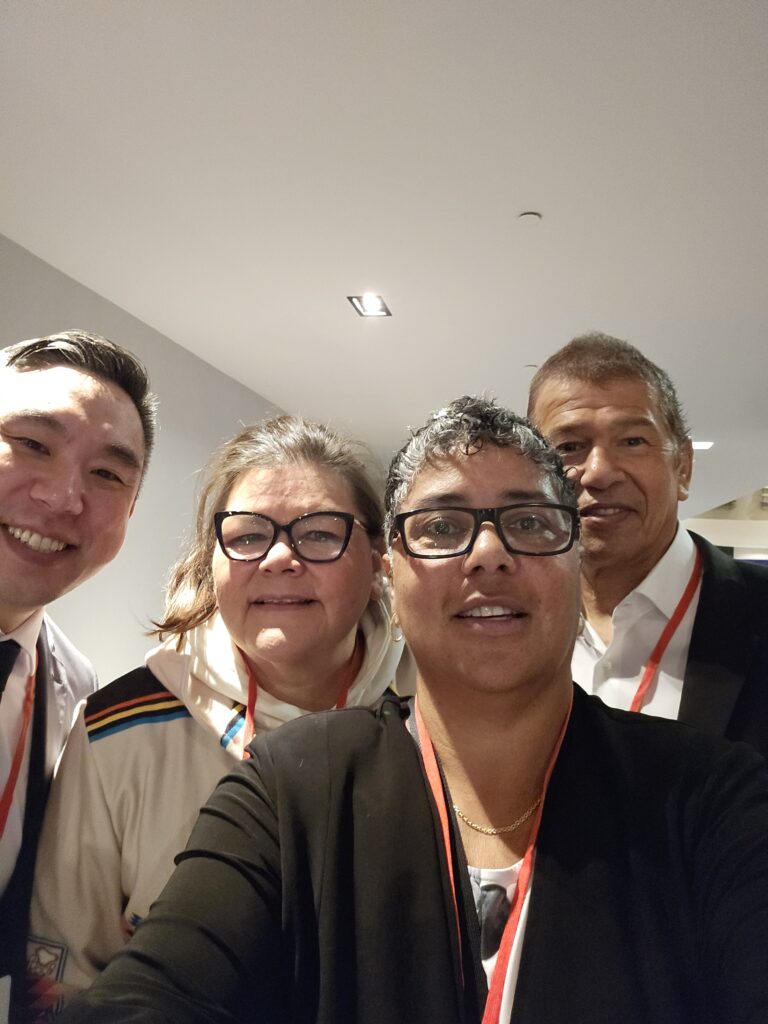This piece originally appeared in our newsletter, “Carnegie Corner,” Issue No. 13.
Angela James received The CI’s Lifetime Achievement Award in January as recognition for her more than 40 years in the game as a coach, official, player, co-owner, and general manager. A member of The CI’s Board of Directors, she is regarded as the “first superstar of modern women’s hockey.” The Toronto native was a member of the Canadian Women’s Hockey team for a decade during which time she remarkably won four World Gold Medal and four International Pacific Rim championships. She also became the first and only Black woman to be named captain of the Canadian Women’s team. In 2010, she was one of two of the first women inducted into the Hockey Hall of Fame.
This interview has been edited for length and brevity.
CI: What did it mean to you to receive The CI’s Lifetime Achievement Award at the Summit in January?
AJ: Well, the timing of that award was extra special with having the vibe that was in Toronto for the All-Star Week. And, also having The Summit in Toronto where the celebration kind of went all over the news. The number of the congratulatory messages I received was just outstanding.
But, when you hear the words lifetime achievement for myself, that not only says I’m getting old but it certainly kind of puts everything together of what I’ve done in our great sport over the past 40-50 years. You know whether it be, a parent in hockey, coaching in hockey, officiating in hockey, playing in hockey, instructing, guest speaking, everything to do with hockey. And, the funny thing is that I’m still doing a lot of those things right now.
CI: Have you ever thought about what a young Angela James could accomplish in today’s new world of women’s hockey?
AJ: Well, with the dedication and the commitment to the game and to individual skill development is phenomenal in terms of the athletes that are playing hockey today. The ones that are sacrificing and making themselves the best that they can be, I think the buy-in is just phenomenal. So, if I had those kinds of opportunities to elevate my game even higher that would just be phenomenal for a young Angela James. But, for an old Angela James right now, I don’t have the energy. I’m still playing now and it’s taking every bit of energy to get back into it and play five times a week. But, my body’s not cooperating. I think I abused it a little bit too much when I was younger.
CI: What do you think the state of women’s hockey will look like five years from now?
AJ: Well, it’s not just women’s hockey. I think it’s hockey in general. Both men’s (and women’s) hockey. At the amateur level, I think that it’s still a game that needs to really be taken a look at. It’s gotten a little bit out of control in terms of affordability and accessibility; access to great programs. That, to me, is going to be key for the success of hockey for years to come. We have to make it more inviting and inclusive and affordable. If we can get a handle on that so the parents aren’t having to work an extra job or two just to keep their kids in hockey. I think that’s a direction that we really have to pay attention to. I don’t think it’s just about, ‘here’s a set of equipment and free clinic.’ It’s got to be long term, it’s got to be buy-in programs for longevity.
Hockey’s a great game and so many people love the game. And we really have to embrace our immigrants because they’re increasing our populations and we need to keep making sure that it’s inclusive so that they can buy into this great game. I also think that at the professional level it’s just such a business, and I really think that if we’re going to continue for the women’s game that we have to have investors. And, not just even at the pro level, but corporations that are investing in amateur sports and continue to offer sponsorship and programs within the different communities.

Angela James (front) takes a selfie with (L-R) Chi-Yin Tse, Marian Jacko, and Ted Nolan at The CI Summit 2024 in Toronto.
CI: Was there a particular instance in your life you recall as the moment you fell in love with hockey?
AJ: Yeah. On the ultrasound with a stick in my hand. (laughs).
I grew up in Community Housing and we didn’t have a lot of programs or a lot of ice time. But, one thing we did have is outdoor ice hockey. And, the kids in our neighbourhood, we played ball hockey constantly every day. So, I would wake up in the morning, I would have my bowl of cereal and my mom would say, ‘out you go,’ because that’s what they did. We would go out and would play hockey. I just loved hockey right from the beginning. When the boys would let me play and once they started letting me play, besides goalie, I just continued to play and love the game.
CI: What are the most immediate challenges The CI must focus on to see more progress in making the sport more inclusive and welcoming to all?
AJ: I think that The Carnegie Initiative needs to not be afraid to hit issues right on and try to embrace it and recommend (solutions). I know that we’re not all doctors and lawyers, but I really think that the true stories need to be told. I really think that we shouldn’t try and sugarcoat anything. I really think that The Carnegie Initiative, through education and through The Summit, and hopefully mentorship, we can certainly try to embrace some of the diversity and discrimination that’s out there, and lead people in different directions, more positive directions.